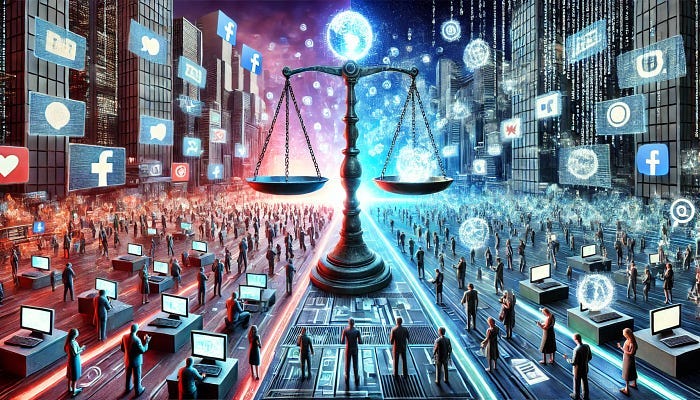The Collapse of the Misinformation Economy
Why Truth is the Next Great Market Opportunity
For decades, outrage has been the most valuable commodity in media, technology, and business.
News outlets, social media platforms, and corporations built empires by fueling division, amplifying controversy, and feeding consumers the narratives they craved — regardless of accuracy.
But every economic model has a tipping point, and misinformation is reaching its breaking point.
Engagement-driven content, designed to provoke anger and deepen ideological divides, was once the lifeblood of media and digital platforms. But the same tactics that once maximized profit are now losing their effectiveness. Audiences are growing desensitized, advertisers are pulling back, and regulatory scrutiny is tightening. The age of misinformation, once a thriving industry, is on the verge of collapse.
The next great business leaders aren’t investing in division — they are pivoting toward trust, credibility, and problem-solving. Because the future of capitalism belongs to those who build, not those who manipulate.
The Rise and Fall of the Misinformation Economy
The misinformation economy was built on three core principles:
1️⃣ Outrage fuels engagement. People react more strongly to high-emotion content, and this reaction drives clicks, shares, and revenue. A 2021 study by the Pew Research Center found that high-emotion content spreads 70% faster than neutral news.
2️⃣ Social media prioritizes controversy over accuracy. Platforms don’t have an agenda — they follow the market. Algorithms are designed to maximize engagement, and since outrage drives interaction, it became the dominant strategy.
3️⃣ Fear sells. Misinformation wasn’t just a side effect — it was a business model. Fear-based narratives, tribal loyalty, and ideological silos became monetizable assets, keeping users addicted to conflict-driven content.
But every unsustainable market eventually collapses.
The Signs of the Tipping Point
The misinformation economy is no longer as profitable as it once was. The same tactics that once generated billions are losing their effectiveness. The signs are everywhere:
📉 Audiences are becoming desensitized. Outrage fatigue is setting in. People are tuning out of the content that once kept them addicted to division.
💸 Advertisers are pulling back. Big brands don’t want their money funding social decay, misinformation, and radicalization. Companies are investing in credibility, not controversy.
⚖️ Regulation is tightening. Lawmakers around the world are cracking down on algorithmic manipulation, fake news, and deceptive media practices. The unchecked misinformation model is no longer legally viable.
🚀 An uninformed society doesn’t innovate. When people stop thinking critically, they stop solving problems. A society addicted to misinformation stagnates, which threatens economic growth and long-term prosperity.
The real threat to capitalism isn’t regulation — it’s stagnation.
The most visionary entrepreneurs recognize this and are pivoting before the collapse.
The Next Great Business Opportunity: Truth as a Competitive Advantage
The most successful business leaders of the future will not be those who profit from misinformation — they will be those who profit from trust, knowledge, and problem-solving.
The shift is already happening:
✅ Advertising is moving away from clickbait sensationalism. Brands now associate their long-term value with credibility, not controversy.
✅ Social media platforms are adjusting. As outrage-fueled engagement declines, platforms will shift toward meaningful, knowledge-based interactions to retain users.
✅ Consumers are demanding depth over distraction. The future audience is less interested in reactionary content and more interested in content that helps them think, grow, and innovate.
✅ Businesses built on transparency and accuracy will thrive. Companies that educate, inform, and equip people with real knowledge will become the new market leaders.
The next great economic wave will not be built on outrage — it will be built on solutions.
The Market Dictates: Adapt or Perish
This is the moment of choice.
For decades, misinformation was profitable. But now, it is reaching its point of diminishing returns. The market is shifting. The boiling point is near.
So the question is simple:
🔹 Will you continue to reward deception, or will you demand progress?
🔹 Will you consume reactionary content, or will you engage in intellectual curiosity?
🔹 Will you be manipulated, or will you be empowered?
The age of misinformation made money.
But the future belongs to those who build.
The next wave of great business leaders won’t be those who divide — they will be those who solve.


